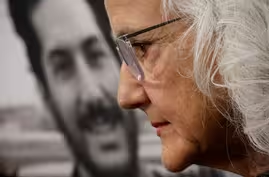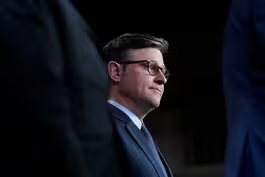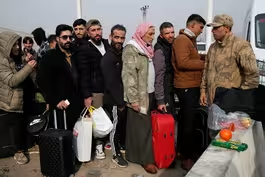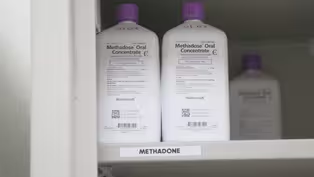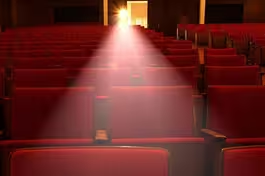
Electoral College meets to cast official votes for president
Clip: 12/17/2024 | 5m 29sVideo has Closed Captions
Electoral College meets to officially cast votes for president
The election may have ended over a month ago, but Tuesday marks the day Donald Trump’s victory becomes official. Across the country, hundreds of presidential electors gathered in their states to cast their Electoral College votes, an often ceremonial but essential step in the process of confirming the election results. Geoff Bennett discussed the significance with Jessica Huseman of Votebeat.
Problems playing video? | Closed Captioning Feedback
Problems playing video? | Closed Captioning Feedback
Major corporate funding for the PBS News Hour is provided by BDO, BNSF, Consumer Cellular, American Cruise Lines, and Raymond James. Funding for the PBS NewsHour Weekend is provided by...

Electoral College meets to cast official votes for president
Clip: 12/17/2024 | 5m 29sVideo has Closed Captions
The election may have ended over a month ago, but Tuesday marks the day Donald Trump’s victory becomes official. Across the country, hundreds of presidential electors gathered in their states to cast their Electoral College votes, an often ceremonial but essential step in the process of confirming the election results. Geoff Bennett discussed the significance with Jessica Huseman of Votebeat.
Problems playing video? | Closed Captioning Feedback
How to Watch PBS News Hour
PBS News Hour is available to stream on pbs.org and the free PBS App, available on iPhone, Apple TV, Android TV, Android smartphones, Amazon Fire TV, Amazon Fire Tablet, Roku, Samsung Smart TV, and Vizio.
Providing Support for PBS.org
Learn Moreabout PBS online sponsorshipGEOFF BENNETT: The election may have ended over a month ago.
The election may have ended over a month ago, but today is the day Donald Trump's victory becomes official.
Across the country, hundreds of presidential electors are gathering in their respective states to cast their Electoral College votes, an often ceremonial, but essential step in the process of confirming the election results.
To help us break this down and explain its significance, we're joined now by Jessica Huseman, editorial director of Votebeat.
That's a news organization focused on elections and the voting process.
Welcome back.
And I have to say, we're glad you're here because we have reported extensively this past year on election security and the integrity of the voting process, so we thought it fitting to see this process all the way through.
When we say that the Electoral College is convening in all 50 states, help us understand what that actually means.
JESSICA HUSEMAN, Editorial Director, Votebeat: You know, it's not that exciting.
All of the people who are chosen as the electors by the political parties in each state are gathering in one place and casting their ballots officially for the people their state selected as president, usually on a winner-take-all basis, unless you live in Maine or Nebraska.
And then, in that case, the electors get to vote proportionally, but everyone else is just voting along the exact same lines as what the state voted for.
GEOFF BENNETT: And we should note that there are 13 Republican officials who signed false certifications claiming that Donald Trump won the election back in 2020.
They are now serving as electors today, this time casting real votes for the president-elect.
All of these folks hail from Michigan, Pennsylvania, and Nevada.
Do we know why there was no recourse for these 2020 fake electors when other people have faced court cases and legal issues?
JESSICA HUSEMAN: Sure.
So, some of these people still are facing legal issues.
There are eight of them that are currently facing charges in Nevada and Michigan, but certainly they didn't face any repercussions whatsoever within the Republican Party.
The Republican Party still brought them back.
Republicans still voted for these folks to be the people who cast these, even if ceremonial, quite important ballots today.
So, yes, I think that they're unlikely to face political repercussions at any point moving forward, even if they do face misdemeanor penalties in their states.
GEOFF BENNETT: There's also the question of public sentiment.
And there's a recent pew poll that found voters feel broadly positive about how elections were conducted this past year.
That's in sharp contrast to 2020.
You see the numbers there.
And it's especially true for Trump voters; 93 percent of Trump voters say the 2024 elections were run and administered at least somewhat well.
That's up from 21 percent four years ago.
And the only difference is, their candidate won.
I mean, the 2020 and 2024 elections were both secure and fair.
JESSICA HUSEMAN: Yes, absolutely.
I mean, I think it is true that the 2020 and the 2024 elections look a little bit different.
We were certainly in a pandemic in 2020.
Many more people were casting their votes by mail.
But in terms of the procedures, the security, the way those ballots were counted, the way those ballots were audited, it's basically the same.
We -- there have been no major changes in the way that America's elections are conducted between 2020 and 2024.
And so I think that what this really shows is that we are a nation of sore losers.
When our candidate wins, we are happy.
When our candidate loses, the entire system is corrupt.
GEOFF BENNETT: Looking at the calendar, there are a few more key dates that are important in this electoral process ending on Inauguration Day, of course.
Walk us through what we can expect.
JESSICA HUSEMAN: So, the votes that are being cast today by all of the electors across the country are going to go to Washington and they will be signed off on in a procedure that became quite famous in 2021.
It's happening on the same day, January 6.
Those votes will be signed off on by the vice president this time.
That's Kamala Harris.
And so that's the first time that we will see all of these electors coming together and for -- and officially nationally signing off on the results.
And then, of course, we have an Inauguration Day.
So it's all downhill from here.
GEOFF BENNETT: The effort to scrap the Electoral College, I mean, it usually gets kicked around every four years.
Where does that stand now?
JESSICA HUSEMAN: Nowhere.
It doesn't stand anywhere.
It would be really, really difficult to overturn the Electoral College.
It would definitely require either a constitutional amendment or for lots of states working in concert to change the procedure across the country and agree to do that.
So it's quite a lot of work.
And the last time that this was even remotely successful was in the late '60s.
So I think that we're going to be stuck with the Electoral College for quite some time, unless there is a national movement that has, as far as I am aware, not gained a lot of steam.
GEOFF BENNETT: Jessica Huseman of Votebeat, thanks, as always.
JESSICA HUSEMAN: Thank you.
Austin Tice's mother has renewed hope he will be found
Video has Closed Captions
Clip: 12/17/2024 | 9m 53s | After fall of Assad, mother of Austin Tice has renewed hope son will be found in Syria (9m 53s)
Congress working on budget deal to avoid government shutdown
Video has Closed Captions
Clip: 12/17/2024 | 5m 20s | Congress working on budget deal to avoid government shutdown, fund hurricane relief (5m 20s)
Displaced Syrians return to rebuild homes and families
Video has Closed Captions
Clip: 12/17/2024 | 8m 23s | Displaced Syrians return to face daunting task of rebuilding homes and families (8m 23s)
Opioid crisis renews focus on expanding access to methadone
Video has Closed Captions
Clip: 12/17/2024 | 10m 21s | Opioid crisis renews focus on expanding access to methadone treatment (10m 21s)
The significance of movies added to National Film Registry
Video has Closed Captions
Clip: 12/17/2024 | 4m 25s | The cultural significance of the movies just added to the National Film Registry (4m 25s)
Providing Support for PBS.org
Learn Moreabout PBS online sponsorship
- News and Public Affairs

FRONTLINE is investigative journalism that questions, explains and changes our world.

- News and Public Affairs

Amanpour and Company features conversations with leaders and decision makers.












Support for PBS provided by:
Major corporate funding for the PBS News Hour is provided by BDO, BNSF, Consumer Cellular, American Cruise Lines, and Raymond James. Funding for the PBS NewsHour Weekend is provided by...
